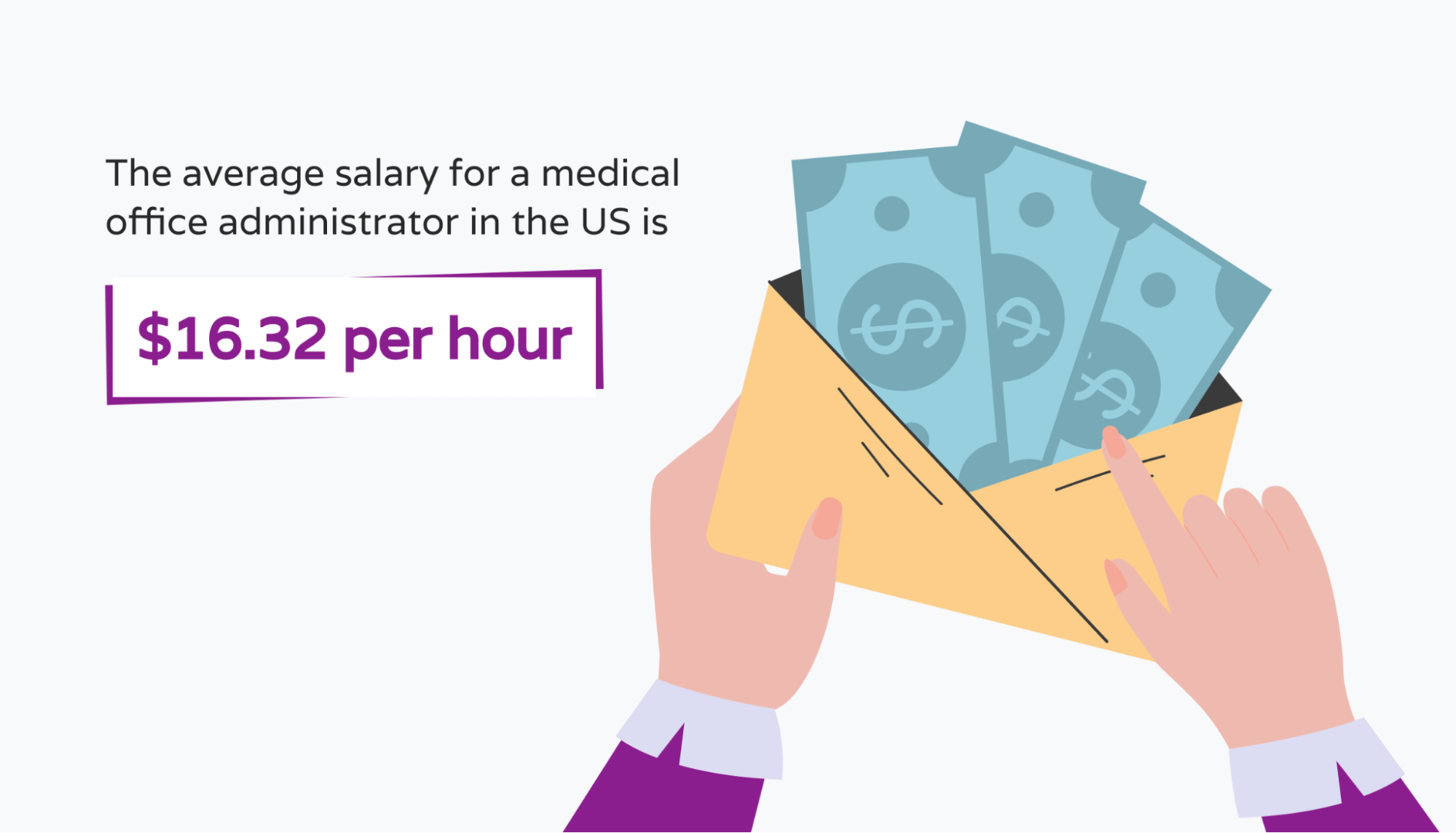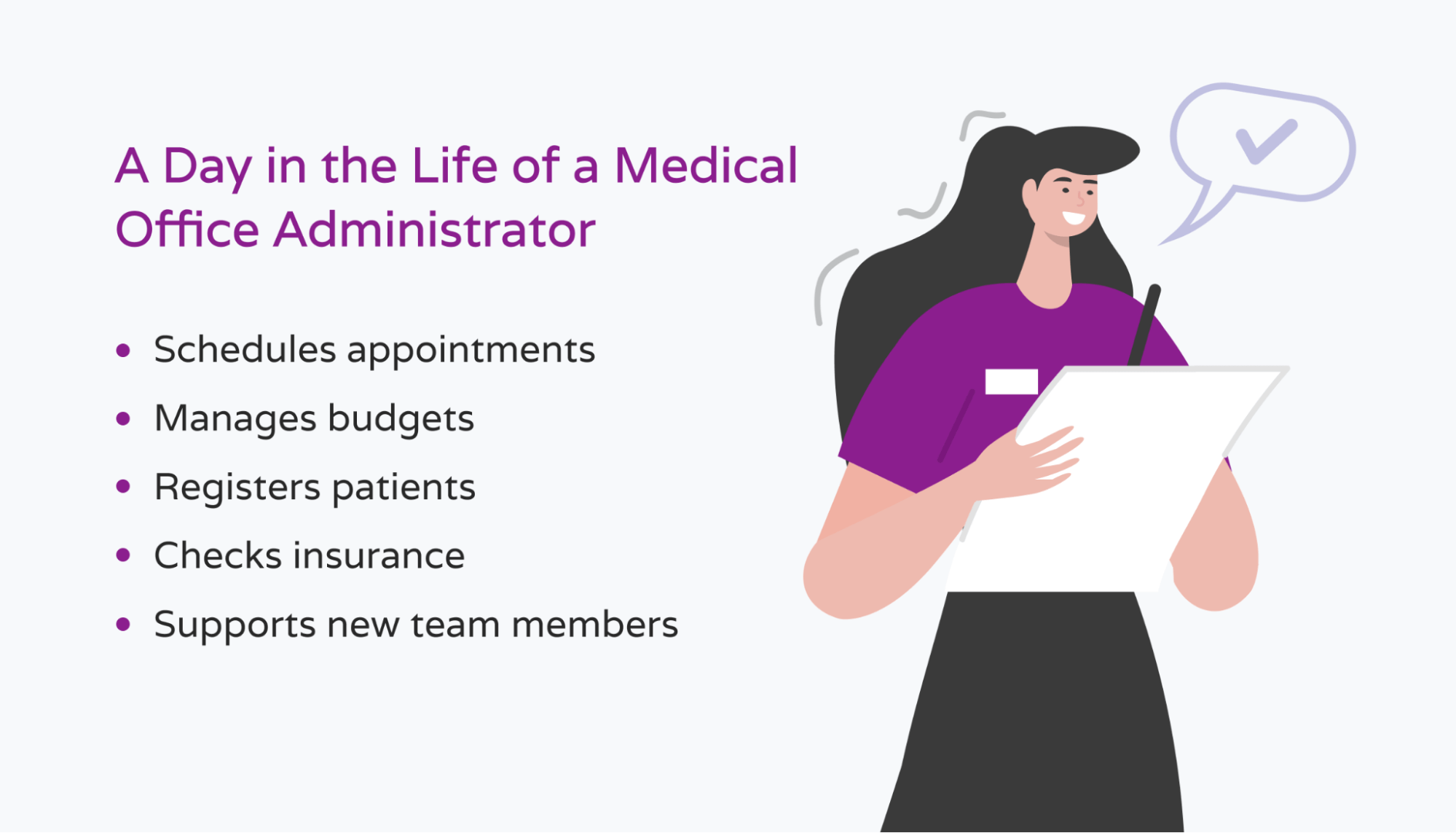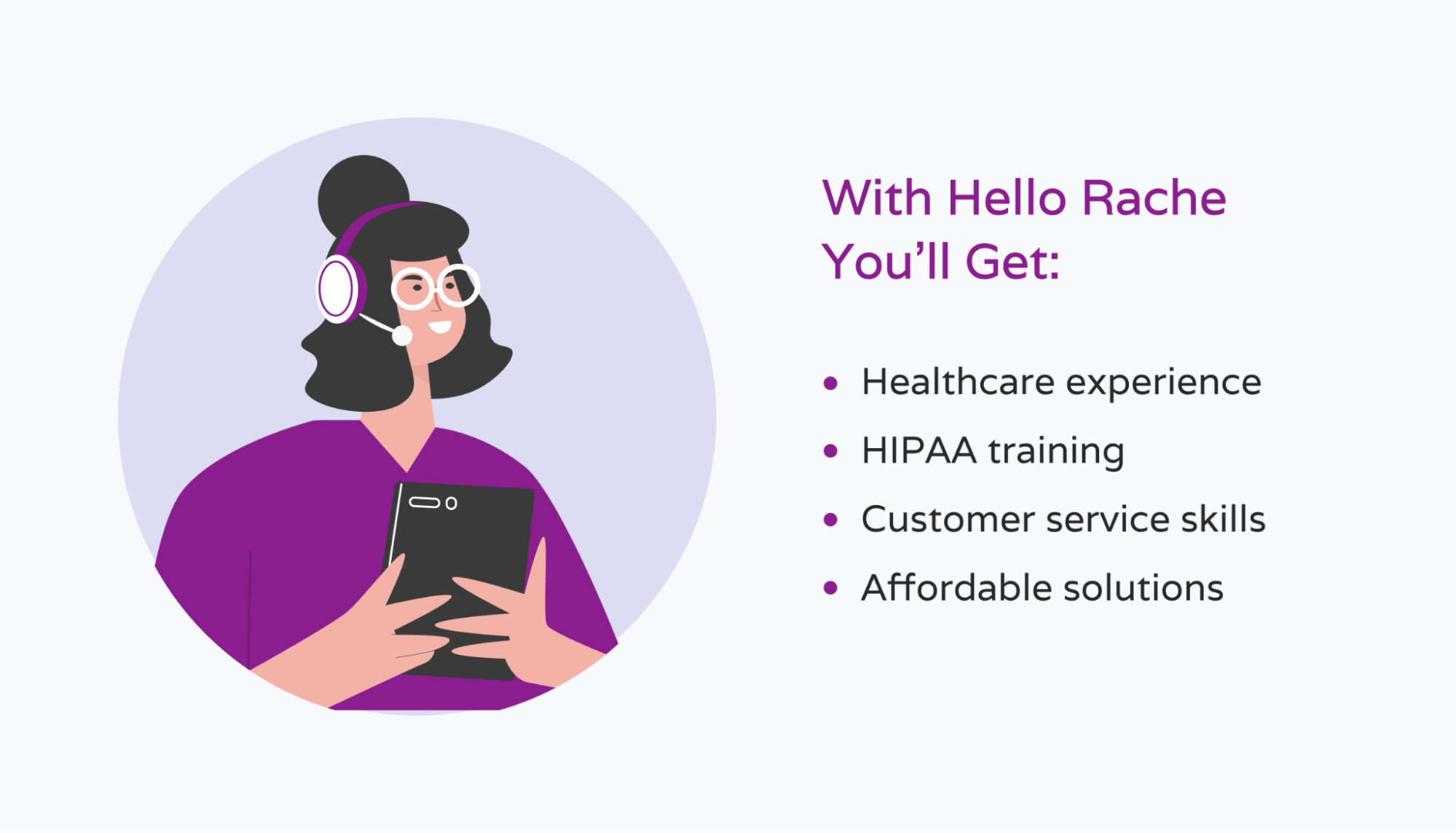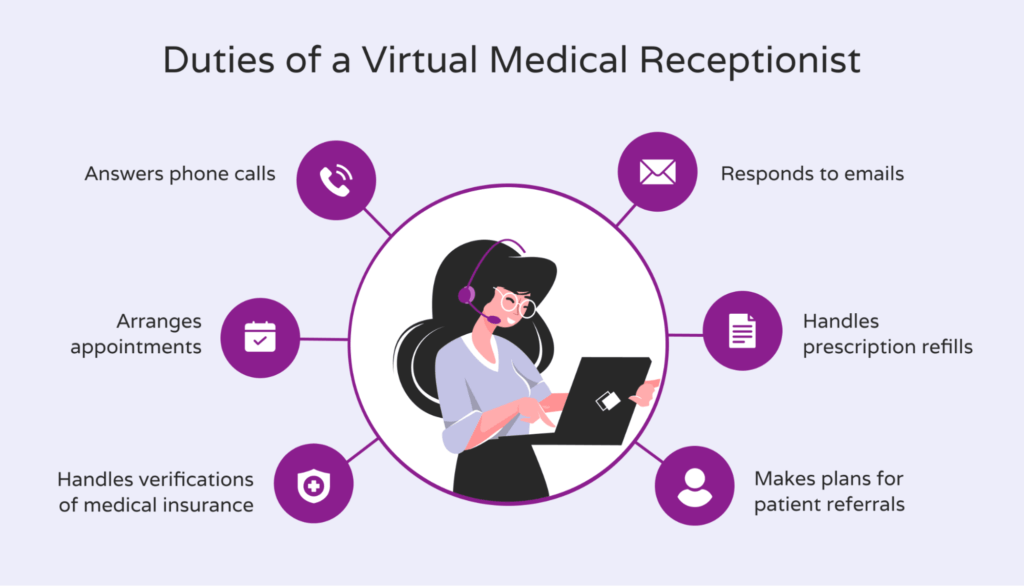Medical office administrators work in a range of office settings. You can find them throughout the healthcare industry, including hospitals, private practices, and dental clinics.
If your medical practice needs administrative support, you might be looking for someone to fill this office role.
Of course, hiring a new team member is a commitment. You’ll need to pay them a salary and offer them training, a workspace, and the tools for the job.
Before you start looking for an in-person medical office administrator, read this article. We’ll tell you what medical office administrators do and what their average salary is.
Plus, we’ll compare this role to that of a Healthcare Virtual Assistant (HVA) so that you can make the best possible decision for your healthcare organization.
What is a medical office administrator?
Medical office administrators are responsible for a range of office activities. They support administrative teams, train staff, process payroll, answer phone calls, and help with general office tasks.
These team members assist your medical staff and make sure the practice is running smoothly.
Medical office administrators deal with patients, data entry, and inventory management. They are highly organized, with good computer skills and time management.
If you need help in your healthcare office, a Healthcare Virtual Assistant from Hello Rache will get you on track. Our team members have industry experience and exceptional office skills. From scheduling appointments to updating patient files, we’ve got you covered.
There’s no long-term commitment, and you can get support whenever you need it. Our HIPAA-trained team members can even work after hours or on weekends.
Learn more about our virtual assistant services today.
How much does a medical office administrator make?
Let’s talk about salary. The cost of a medical office administrator can vary depending on the office’s location, the hours they work, and their experience.
In the US, the average hourly wage for a medical office administrator is $16.32 per hour. For full-time workers, the average salary is $32,640.

For someone with less than one year of experience, the average wage is $15.12 per hour. If you hire a person with more than five years of experience, this rate jumps to $17.23 per hour.
Medical office administrators in the 10th percentile make $12.34 an hour, while those in the 90th percentile make $22.68 per hour.
It’s not just the base salary you need to consider, though. There are also other costs for new employees related to orientation, equipment, and training.
Plus, you’ll need to offer a complete insurance package, such as health insurance, life insurance, and dental and vision insurance. These wage estimates don’t include vacation time, overtime, or retirement plans.
Want a cheaper alternative without sacrificing quality? An HVA from Hello Rache comes at a flat rate of just $9.50 per hour.
What do you need to work in medical office administration?
Someone who wants to work in this role will need a high school diploma or equivalent.
Most medical office administration jobs require an associate degree. Those with advanced degrees can make more per hour and have more responsibilities.
Medical office administration certification or experience can also be a job requirement.
These workers need many different skills, including customer service skills, leadership skills, organizational skills, and time management. In addition, look for strong communication skills and attention to detail.
Advanced skills include technical skills, accounting knowledge, and transcription experience.
Remember, many of our HVAs have similar education and experience to medical office administrators. If you’re looking for high-quality, flexible assistance, an HVA is a smart choice.
What does a medical office administrator do?
Medical office administrators support healthcare professionals and perform a variety of office tasks.

Before you make a decision, learn about some of medical office administrators’ most common duties. Here are five tasks you can expect a medical office administrator to do:
1. Schedule appointments
Medical office administrators are experts in calendar management. They can schedule medical appointments over the phone, online, or in person.
They play a key role in customer service and should have strong interpersonal skills. If someone has a complaint, they should be able to handle it with professionalism and care.
Whether it’s booking patients in for standard doctor’s appointments or organizing a busy surgery schedule, the right person will get the job done.
Alternatively, you can use a Hello Rache HVA who can manage your bookings with ease.
2. Manage budgets
Medical office administrators oversee budgets. They often help with payroll, invoicing, and paying bills. They can keep track of medical supplies and order more stock as required.
Depending on their experience, some medical office administrators are involved in financial planning. For example, they work with office managers to set goals for growing the business.
They can be present and contribute ideas during staff meetings.
These office team members may also be responsible for patient accounts. They can process payments by cash or credit card and print receipts. If payments are overdue, they can send a letter to follow up.
3. Register patients
When patients arrive, medical office administrators make them feel welcome. They confirm each patient’s personal details, including their name, phone number, and date of birth.
Sometimes the waiting room will be busy, and patients will be asked to wait. A medical office administrator who keeps doctors updated on patient arrivals will ensure that no one is missed.

If there’s a new patient, a medical office administrator will ask them to complete a form before their appointment.
In a hospital setting, these team members may go through more in-depth medical records. For example, a surgeon may need to verify additional details about a patient before an operation, and a medical office administrator can help with that.
4. Check insurance
Insurance plays a part in every healthcare organization. A medical office administrator is responsible for record-keeping and registering insurance details.
They communicate with patients and help them with claims processes. If they’re experienced, a medical office administrator can explain to patients what’s covered by their policy.
Dealing with insurance isn’t always straightforward, and things can change over time. To get the right information, medical office administrators may need to communicate directly with health insurance providers.
5. Support new team members
Staff members come and go. When you find someone new, it’s important that they understand how your medical practice runs.
There’ll be specific day-to-day activities new team members will need to complete. Plus, there’ll be processes and software unique to your business that they’ll have to learn.
A medical office administrator can support new team members and make sure they receive the right training.
For example, if a new medical office assistant joins a practice, the medical office administrator will make sure they understand medical terminology. They’ll also show them how to schedule appointments with your booking system.
When should you use a Healthcare Virtual Assistant?
If you need help with general office tasks, a Healthcare Virtual Assistant is a practical solution. You’ll get all the assistance you need at a much lower cost.
The Hello Rache team can tick off your daily to-do list and streamline your office. For example, they have excellent phone skills and can schedule appointments, answer questions, and contact insurance providers.

If your paperwork is getting out of hand, an HVA can update patient files and transcribe documents. With their advanced computer skills, accurate typing, and confidence in using a range of software applications, they’ll perform all work to a high standard.
Most of our team members have real healthcare experience, and many have worked as nurses or physician assistants. As such, they understand medical terminology and the healthcare landscape.
Our HVAs are HIPAA-trained, and they’ll keep all sensitive data confidential and secure. We can replace almost any in-person administrative position with a virtual one.
What about productivity? Even though our HVAs work remotely, they’ll boost your productivity. They have excellent organizational skills and know how to manage their time effectively. Our team can work unsupervised and are ready to start working whenever you need them.
Don’t forget: Hiring an HVA is an affordable solution. When you compare the average wage of a full-time employee to that of an HVA, an HVA is better for your bottom line.
With our help, your office tasks will be taken care of so that you can get back to your medical duties.
Get the most from your salary budget with an HVA
Do you need someone to oversee your medical office and perform a range of administrative duties? You may be considering a medical office administrator.
Some of their most common tasks include scheduling appointments, managing budgets, registering patients, and checking insurance. If you have new team members, these administrative workers can give them training and supervision.
Medical office administrators work in different medical office settings, such as hospitals and private practices. As mentioned in this article, their average wage is around $16.00 per hour.
The good news is that there’s a more affordable option. Hello Rache has a team of experienced and professional Healthcare Virtual Assistants. From transcription to patient bookings to basic accounting, our HVAs will get it done.
And with HVAs, there’s a flat rate of just $9.50 per hour.
Want to learn more? Get in touch with us today to discuss our services. If you want to see more articles like this one, check out the Hello Rache blog.



